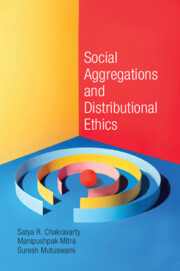Book contents
- Frontmatter
- Contents
- Preface
- 1 Introduction
- 2 Individual and Social Orderings
- 3 May’s Theorem
- 4 Arrow’s Theorem with Individual Preferences
- 5 Relaxing Arrow’s Axioms
- 6 Arrow’s Theorem with Utilities
- 7 Harsanyi’s Social Aggregation Theorem
- 8 Distributional Ethics: Single Dimensional Approaches
- 9 Distributional Ethics: Multidimensional Approaches
- 10 Social Choice Functions
- 11 Strategyproofness on Quasi-linear Domains
- Index
5 - Relaxing Arrow’s Axioms
Published online by Cambridge University Press: 11 January 2023
- Frontmatter
- Contents
- Preface
- 1 Introduction
- 2 Individual and Social Orderings
- 3 May’s Theorem
- 4 Arrow’s Theorem with Individual Preferences
- 5 Relaxing Arrow’s Axioms
- 6 Arrow’s Theorem with Utilities
- 7 Harsanyi’s Social Aggregation Theorem
- 8 Distributional Ethics: Single Dimensional Approaches
- 9 Distributional Ethics: Multidimensional Approaches
- 10 Social Choice Functions
- 11 Strategyproofness on Quasi-linear Domains
- Index
Summary
INTRODUCTION
In this chapter, we explore the extent to which we can escape the dictatorship result if we relax some of Arrow’s axioms. If we relax independence of irrelevant alternatives, then we get the Borda Count which is a well-defined social welfare function satisfying unrestricted domain and weak Pareto. This we have already discussed is Example 4.5 of Chapter 4. In Section 5.2, we relax weak Pareto and replace it by a weaker axiom of non-imposition and then we get the result due to Wilson (1972) that stipulates that a social welfare function satisfying unrestricted domain, independence of irrelevant alternatives, and non-imposition axioms must be null or dictatorial or inverse-dictatorial, given that the number of alternatives is not less than three. Both inverse-dictatorial and null social welfare functions are quite uninteresting. Inverse-dictatorship requires that there exists an agent i whose strict preference over every pair of alternatives is reversed for the society under all profiles in the domain. Like inverse-dictatorial social welfare function, the null social welfare function is also uninteresting since the society is always indifferent across all alternatives for all possible profiles in the domain.
In Section 5.3, we relax transitivity of social preferences and then either we end up in oligarchy or we end up violating the no veto power. Specifically, the oligarchy result, due to Weymark (1984), specifies that a social quasi-ordering that satisfies unrestricted domain, weak Pareto, and independence of irrelevant alternatives must be oligarchic, given that the number of alternatives is not less than three and the set of individuals is finite. In this context, we also derive the Liberal Paradox due to Sen (1970b) that shows that there is no social weak quasi-ordering that satisfies unrestricted domain, weak Pareto, and a very weak form of liberalism. Finally, in Section 5.4, we relax the axiom of unrestricted domain and assume single-peaked preferences and then we can escape Arrow’s dictatorship conclusion. A set of individuals is said to have single-peaked preferences over a set of possible alternatives if the alternatives can be ordered along a line such that the following two conditions hold: (i) each agent has a best (or most preferred) alternative in the set, and (ii) for each agent, alternatives that are further from his or her best alternative are preferred less.
- Type
- Chapter
- Information
- Social Aggregations and Distributional Ethics , pp. 57 - 76Publisher: Cambridge University PressPrint publication year: 2023



